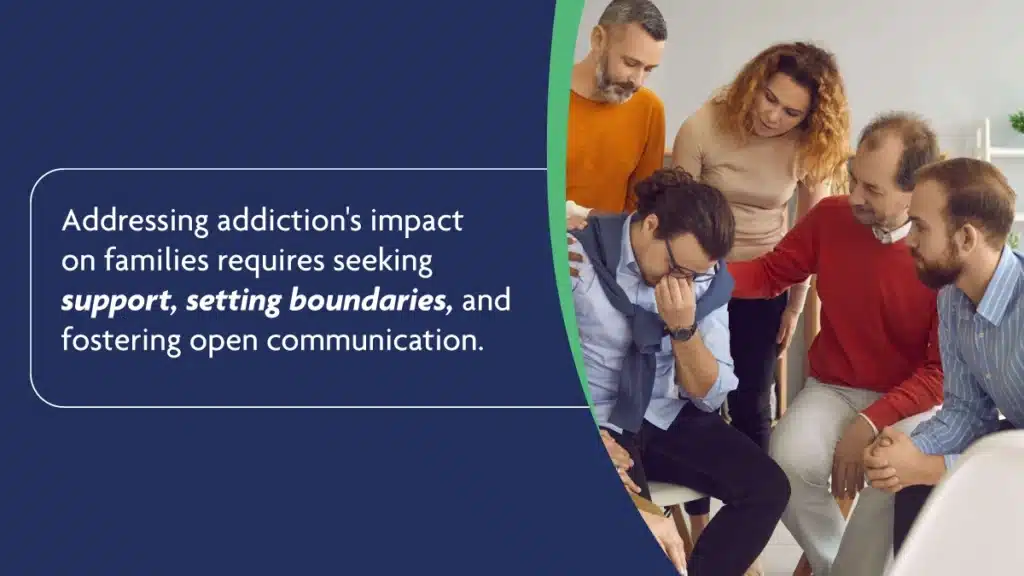Addiction is a complex issue that doesn’t just affect the individual grappling with substance abuse. It profoundly impacts their entire family unit. That’s the reason why addiction is often referred to as a “family disease.”
The ripple effects of addiction can permeate every aspect of family life, leading to stress, conflict, and dysfunction. Continue reading as we explore how addiction ripples through families and the possible effective recovery options.
Key Takeaways
Addiction affects not just the person but the whole family, causing stress and strain on relationships. This article talks about:
- Addiction as a family disease means that the effects of addiction extend beyond the individual to impact the entire family unit.
- Addiction creates emotional, social, and financial strain on families, affecting their well-being and relationships.
- Addressing addiction’s impact on families requires seeking support, setting boundaries, and fostering open communication.
Our teen treatment center offers comprehensive support and resources tailored to your teen’s needs. Dial (845) 479-6888 for detailed information.

Understanding Drug Addiction As A Family Disease
Drug addiction, or substance use disorder (SUD), is a complex condition marked by compulsive drug use despite harmful consequences. It is a chronic brain disease that doesn’t discriminate. It impacts people from all walks of life, regardless of age, gender, or socioeconomic status.
At its core, addiction disrupts normal brain functioning, leading to intense cravings and a lack of control over drug use. This can strain relationships, create financial instability, and cause emotional distress for everyone involved. However, addiction’s impact extends beyond the individual using drugs. It permeates the entire family dynamic.
Family members often experience a range of emotions, including fear, anger, guilt, and shame, as they witness their loved one’s struggle. They may feel helpless and unsure of how to support a family member. Moreover, the behaviors associated with addiction, such as lying, manipulation, and neglect, can erode trust and create tension within the family unit.
Furthermore, addiction tends to perpetuate intergenerational cycles, as children of individuals with SUDs are at greater risk of developing an addiction themselves. Sometimes, family members may unintentionally enable addictive behaviors by providing financial support, covering up for the affected family member, or avoiding addressing the problem altogether.
As a result, addiction becomes a family disease, impacting not only the individual but also their loved ones, often spanning generations.
Impact Of Addiction On Families
Drug and alcohol addiction doesn’t just affect the individual struggling with it. Its effects extend deeply into the lives of all members of the family unit. Here’s a breakdown of the impact of addiction on families:
Emotional Distress
Addiction often brings emotional distress to family members. They may feel sadness, anger, or frustration as they witness a family member struggling with drug abuse and addiction. This distress can take a toll on everyone’s mental well-being.
Strained Relationships
Addiction can strain relationships within a family, leading to misunderstandings, arguments, and a communication breakdown. Trust may be eroded, and family members may feel disconnected from one another as they struggle to cope with the effects of addiction.
Financial Strain
The financial toll of addiction can be heavy. Money that could be spent on essentials like food, housing, or education may instead be drained by the costs of substance abuse, such as treatment programs or legal fees.
Neglect And Abuse
In some cases, addiction leads to neglect or abuse within the family. Responsibilities may be neglected, children may be left without proper care, or abusive behavior may arise under the influence of substances.
Physical Health Problems
The stress of dealing with addiction can take a toll on the physical health of family members. Chronic stress has been associated with a range of physical health problems, including high blood pressure, heart disease, and weakened immune function.
Social Isolation
Families dealing with addiction often experience social isolation. They may withdraw from social activities and relationships out of shame or fear of judgment. This isolation can further worsen the feelings of loneliness and despair.
Legal Problems
Addiction can result in legal issues, such as arrests or legal battles related to substance abuse or criminal behavior. These legal issues add another layer of stress and uncertainty for families already struggling to cope with addiction’s impact.
Recognizing these impacts is essential in providing support and intervention for both the individual struggling with addiction and their families.
How To Address Addiction Impacts On Families
Addiction to drugs and alcohol can have a profound impact on families, but some steps can be taken to address these effects and promote healing and resilience.
Education and Awareness
Understanding addiction as a disease can help family members avoid blaming themselves or the person with addiction. Learning about addiction’s effects and treatment options can provide clarity and empathy.
Open Communication
Encouraging honest conversations within the family can create a supportive environment where everyone feels heard and understood. It’s essential to express concerns, feelings, and needs openly and respectfully.
Setting Healthy Boundaries
Establishing clear boundaries helps maintain a sense of safety and stability within the family. Boundaries include behavior limits, treatment expectations, and consequences for violating agreements.
Joining Support Groups
Support groups for families of individuals with addiction, such as Al-Anon or Nar-Anon, provide a safe space to share experiences, gain support, and learn coping strategies from others facing similar challenges.
Considering Family Therapy
Seeking professional therapy as a family can help improve communication, resolve conflicts, and strengthen relationships. Family therapy sessions provide a structured environment for addressing issues related to addiction.
Practicing Self-Care
Taking care of yourself is essential when dealing with the effects of addiction in the family. Self-care activities such as exercise, mindfulness, and time with supportive friends can help reduce stress and promote overall well-being.
Seeking Professional Help
Sometimes, the challenges posed by addiction require professional intervention. Seeking help from addiction specialists, counselors, or therapists can provide personalized support and facilitate the healing process for the individual and the family.
Fostering A Supportive Environment
Creating a supportive atmosphere at home involves offering encouragement, understanding, and unconditional love. Celebrating milestones, acknowledging efforts, and practicing forgiveness can strengthen family bonds.
By taking proactive steps and fostering a supportive environment, families can navigate the challenges of addiction and emerge stronger together.
Frequently Asked Questions (FAQ)
What role does family play in addiction?
Family plays a crucial role in addiction. They can offer support, encouragement, and understanding, which can help someone struggling with addiction feel loved and motivated to seek help.
However, family dynamics can also contribute to addiction, such as stress, conflict, or enabling behaviors. Family members may unintentionally enable addictive behaviors by ignoring or covering up the problem, making it harder for the person to confront and overcome their addiction.
Therefore, involving family in the recovery process through education and therapy can lead to better outcomes for individuals dealing with addiction.
Is addiction hereditary or a form of brain disease?
Addiction is a complex issue with roots in both genetics and brain function. It’s not just a simple matter of choice. Studies suggest that genetic factors can predispose individuals to addiction, making them more susceptible to its grip.
Additionally, addiction alters the brain’s chemistry and structure, turning it into a chronic brain disease. It affects areas responsible for decision-making, impulse control, and reward processing, leading to compulsive behavior despite negative consequences.
Understanding addiction as both a hereditary and a brain disease helps us approach it with compassion and appropriate treatment, acknowledging the biological factors at play while supporting individuals in their recovery journey.
How does addiction affect family and friends?
Addiction can strain relationships, causing emotional distress and financial burdens for family and friends. Loved ones may feel helpless, frustrated, or betrayed as they witness the individual’s struggle.
Trust can erode due to lies or broken promises, leading to conflicts and tension at home. Family members may experience anxiety, depression, or isolation as they cope with the chaos and uncertainty caused by addiction.
Support groups and therapy can provide guidance and comfort to those affected, fostering understanding and resilience in the face of addiction’s challenges.
Guiding Teens Toward Recovery
We understand the challenges parents face when their teenager is struggling with substance abuse. Our teen treatment facility provides a supportive and effective residential program tailored to guide your child toward a successful recovery. Please know that we are here to help and support your family.
With different types of therapy like individual therapy, group therapy, and family sessions, we provide comprehensive care to address your teen’s needs. Educational workshops and recreational activities, including art and music therapy, are also part of our program to nurture their holistic well-being.Don’t wait any longer. Contact us today at (845) 479-6888 to learn more and take the first step towards their recovery.


